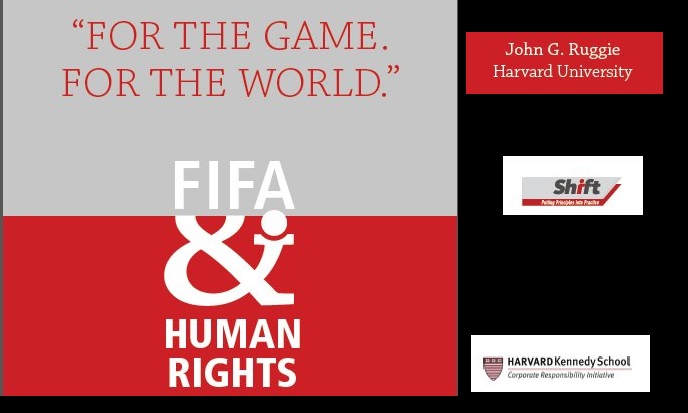
Le professeur de l’Université de Harvard John Ruggie a remis un rapport que la FIFA lui avait commandé sur les droits de l’homme. Il épingle tant la Russie que le Qatar, le plus intéressant pour le long terme se sont ces recommandations qu’il adresse à la FIFA.
Un rapport de plus que qui pointe la responsabilité du Qatar et de la FIFA
Les 42 pages du rapport « For the game, For the world » du professeur de l’Université de Harvard John Ruggie auront-elles une influence sur l’avenir des travailleurs au Qatar ? On finit par en douter, car la FIFA à part se donner bonne conscience ne fera pas appliquer ces recommandations. Et le Qatar continuera malgré ses beaux discours à exploiter les migrants qui travaillent sur les infrastructures du pays.
Pour vous faire une idée de ce rapport voici l’introduction de la problématique par le professeur Ruggie et le lien pour avoir la totalité du document.
In December 2015, FIFA asked me to develop recommendations on what it means for FIFA to embed respect for human rights across its global operations. The authoritative standard for doing so is the United Nations Guiding Principles on Business and Human Rights (“UNGPs”), endorsed by the UN in June 2011, of which I was the author. This report first lays out the relevant human rights context for FIFA, and then presents 25 detailed recommendations for action. They fall broadly under three areas of necessary change:
- From Constitution to Culture: FIFA needs to translate its commitment to respect human rights, included in its new Statutes, into its daily actions and decisions. This includes:
- Setting clear expectations for the work of all parts of the administration and equipping and resourcing staff to deliver;
- Ensuring that these efforts are fully reflected in and supported by decision-making on the part of FIFA’s leadership and governing bodies.
- From Reactive to Proactive: FIFA needs stronger internal systems to address the increasingly predictable human rights risks associated with its business. This includes:
- Evaluating the severity of risks to people across both its activities and its relationships;
- Building and using its leverage to address these risks as determinedly as it does to pursue its commercial interests.
- From Insular to Accountable: FIFA needs to provide greater transparency in managing human rights risks and improve access to remedy. This includes:
- Routinely discussing key issues with external stakeholders, including those whose human rights are at risk, and disclosing its efforts and progress in addressing challenges;
- Ensuring that access to remedy for human rights harm associated with FIFA is available not only on paper but also in practice.
Pour lire l’intégralité du rapport cliquez ici.
